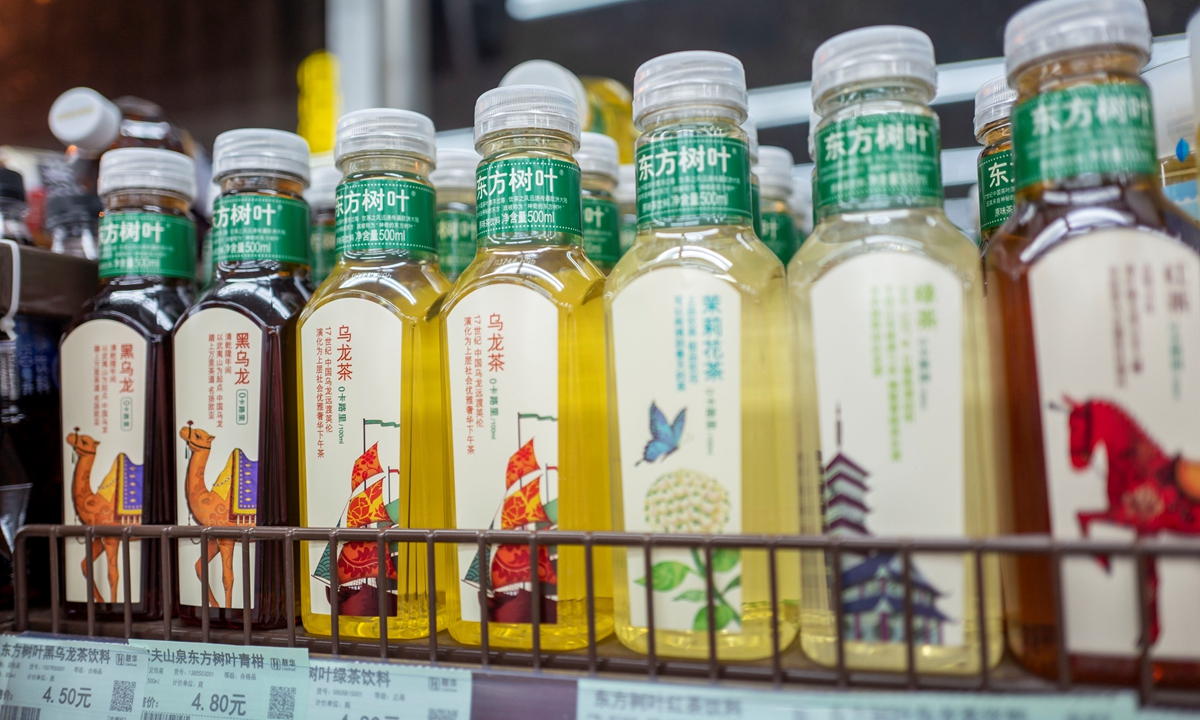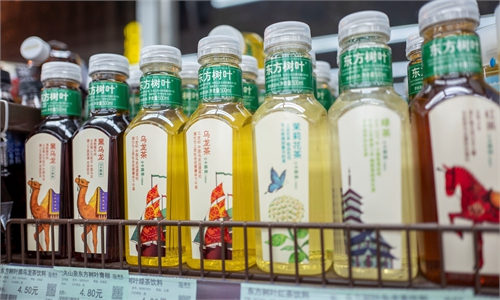Experts rebut Western hype of ‘pink tide damaging Chinese business environment’ amid Nongfu Spring PR challenge

Oriental Leaf series of Nongfu Spring Photo: IC
After Chinese bottled water giant Nongfu Spring and its founder and CEO Zhong Shanshan found themselves at the center of a public opinion storm in recent days, experts on Thursday dismissed Western media hype over a so-called nationalist wave in China posing a threat to private and foreign enterprises, noting that isolated cases do not point to a general trend.
Zhong, the richest man in China, is said to have posted in his WeChat Moment on Wednesday that his 95-year-old mother has passed away due to distress caused by online harassment toward him.
The National Business Daily confirmed the authenticity of Zhong's post on Thursday.
Zhong was targeted by waves of online attacks in prior days, triggered by another Chinese beverage billionaire Zong Qinghou's decease on February 25, who was the founder and CEO of Wahaha, a rival bottled water brand that the public considered a direct competitor with Nongfu Spring.
Out of grief for Zong, who was widely remembered for his charitable behavior, the Nongfu Spring CEO soon became the target of blame on Chinese social media given its complex connections with Zong in the past, while many of which has not been publicly confirmed. The overwhelmingly negative comments thus plunged Nongfu Spring into a PR crisis.
Zhong dismissed the allegations on March 3, while calling on vloggers and internet influencers to stop misleading the public. No matter his brand or Wahaha, they are pursuing the one and only thing, to bring quality products to consumers, Zhong said.
However, Zhong's response did not stop the surge in public opinion. A few days later, Nongfu Spring became embroiled over the packaging of its Oriental Leaf Green Tea drink, as some questioned the design featured Japanese religious buildings.
The brand clarified later that the packaging design is inspired by Chinese temples, not Japanese ones, and that the text on the bottle is about Japanese tea culture originating from China.
Some foreign media depicted the controversies around Nongfu Spring as a "nationalist wave," claiming that the "pink tide" may stifle the growth of other private companies and scare away foreign enterprises.
Rebutting the hype, Zhang Yiwu, a professor at Peking University and a national political advisor, said such phenomenon of diversified public opinions are "completely normal", and it is "extremely common" for enterprises all over the world to encounter these kinds of challenge [in public opinion], not only in China.
Although there are a few extreme reactions over the internet, as can also be found in almost every other online environment in the world, the overall business environment in China is still open and welcoming, Zhang told the Global Times.
"China's environment is much better than that of the US, where private sectors could face the risk of direct confrontations at congressional testimonies."
The expert added that bottled water industry is highly competitive in China, and the public does not reject one in favor of another, nor is there any sense of exclusivity. For example, the French brand of natural bottled mineral water Perrier is still one of the favorites for many urban residents in China.
"While we need better management and guidance for those intense and extreme rhetoric on the internet, Nongfu Spring should also reflect on itself whether it can better respond to public questioning. Rather than keeping silent on the issue, some kind gestures and explanations could vent people's emotion to a great extent," Zhang noted.
Zhang also slammed the "pink tide" smears, saying that Western media is using a trick to generalize individual cases to create a false alarm - as what Voice of America has done that put the Nongfu Spring PR crisis together with a few aggressive remarks about Chinese Nobel Prize winner Mo Yan.
China is fully committed to promoting fairer and more reasonable competition in the private sector. During this year's two sessions, legislation related to the private economy has become a focal point.
On March 8, the National People's Congress Standing Committee work report proposed the establishment of a private economy promotion law within this year, following a previous statement from the Ministry of Justice that such a law will provide solid legal protection to promote the healthy development of the private economy and create a first-class business environment that is market-oriented, rule of law-based, and internationalized.

